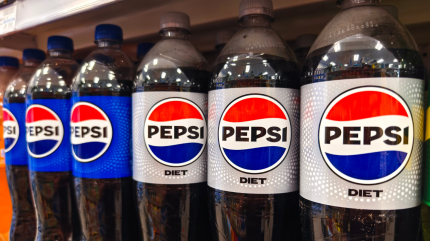
PepsiCo CEO Ramon Laguarta said the company’s domestic beverages division is seeing improvements in margins despite posting a year-on-year drop in operating profit.
The PepsiCo Beverages North America (PBNA) unit reported operating profit of $914m for the company’s third quarter, down from $970m the year before.
Speaking to analysts yesterday (8 October), Laguarta said: “On the margins, we’ve declared very clearly that one of the strategic goals that we have is to keep improving the margins of our beverage business in the US. I think, we’re on track.”
He added: “The business grew margin last year meaningfully and it will grow margin this year meaningfully. And we see a good line of sight to our intentions of the mid-teens margins in a couple of years in PBNA. So, that is working.”
PBNA delivered a 1% rise in its organic revenue year-on-year to $7.18bn, compared to growth of 6% in the third quarter of 2023.
The Mountain Dew owner said the division saw its “fifth consecutive quarter of core
operating margin improvement”, up 90 basis points year on year amid “a double-digit increase in advertising and marketing spend”.
How well do you really know your competitors?
Access the most comprehensive Company Profiles on the market, powered by GlobalData. Save hours of research. Gain competitive edge.

Thank you!
Your download email will arrive shortly
Not ready to buy yet? Download a free sample
We are confident about the unique quality of our Company Profiles. However, we want you to make the most beneficial decision for your business, so we offer a free sample that you can download by submitting the below form
By GlobalData“Core” operating profit from the unit was up 7%, PepsiCo said.
While PepsiCo is planning for the longer term with productivity initiatives, digitalisation and innovation centred on health and wellness, the company’s overall results came with another downgrade in its forecast for top-line group organic sales.
After reporting a non-GAAP 1.3% rise in organic revenue for the third quarter and 1.9% for the year so far, CFO Jamie Caulfield told analysts he did not “expect a huge inflection up or down from the conditions that existed in Q3”.
The snacks and drinks maker revised its guidance lower for the metric and expects a low single-digit increase in organic revenue compared to the “approximately” 4% forecast put forward at the second-quarter results stage in July. The July prediction in itself had already been downgraded from “at least” 4%.
Growth in core, constant-currency EPS is still envisaged at 8% after rising 5% in the quarter to $2.31. Year to date, it was up 7% at $6.20.
“We’re not taking our eyes off the ball in the long term. We don’t think our category will grow at 1% long term,” Laguarta told analysts.
“We think our category, with the investments that we are putting back into the business and the health of our brands, and the innovation that we have in place for this year and next year, will deliver much more than 1%.”
Caulfield was asked to explain the drivers behind the latest organic growth downgrade and the outlook for pricing as the business seeks to spur a pick-up in consumer demand.
“The recovery of the consumer in the US, frankly, has been slower than we had anticipated, and then, to a lesser degree, the geopolitics have impacted international. That’s probably a half-point drag on total PepsiCo revenue growth in the quarter,” he said.
“As far as pricing goes, it’s a bit complex. We’re investing in affordability where it makes sense but we’re investing in a number of levers to stimulate demand and I think it’s too soon to call on what the pricing outlook is going forward.”
Laguarta also gave his take on the Middle East during yesterday’s analysts call. “The Middle East, it’s a different reality, the fact that we have a big business in the Middle East and, yes, it’s been impacted by the geopolitical situation. I don’t think that’s going to change in the coming months.”
In jointly prepared remarks to accompany today’s results, the two executives outlined the business climate going forward.
“We expect consumers to remain choiceful and value-conscious as the cumulative effects of inflationary pressures continue to impact budgets and spending patterns. Pockets of elevated geopolitical tension and macroeconomic pressure are also expected to persist in certain international markets,” they said.
However, those cost pressures are expected to “moderate”, with PepsiCo channelling investment into innovation and additional manufacturing and distribution capacity to support growth.
Laguarta explained: “These platforms are automation of our supply chain – warehouses, manufacturing and distribution centres.
“We have invested a lot in data and organising our data in a way that now we can deploy digitalisation at scale throughout the value chain, from the way we procure to the way we run our factories, to our transportation, to our go-to markets. We’re really digitalising the company.”
Total net revenue for PepsiCo was down 1% at $23.3bn while operating profit fell 4% on a reported basis to $3.87bn. Net income was down from $3.09bn for the quarter, reaching $2.93bn.



